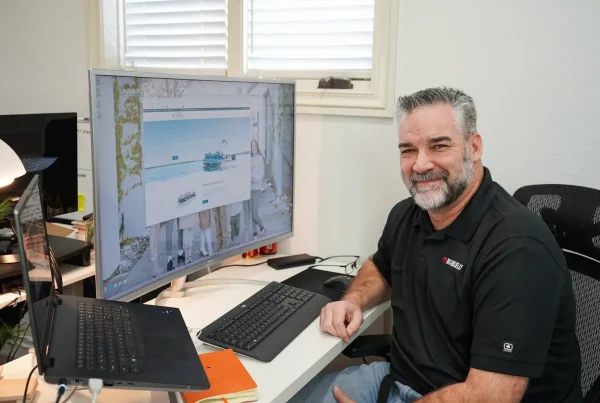We’ve said it before and we’ll say it again, at Big Red Jelly we believe that 2021 is going to be the comeback year for small and local businesses. How do you make sure your business is going to be one of the ones that make a comeback? Here are 3 tactics small business owners, entrepreneurs, managers, and anyone who helps run businesses across the globe and the United States can employ to be more productive. Employing these three tactics helped me significantly improve the amount of stuff that I get done every week and not just stuff, but important action items and projects that actually move our business forward.
1. Make Your Calendar Your Friend
The first tactic that I employ that helps me get more done and be more productive is to make your calendar your friend. I love that phrase. It’s a little bit of a cliche so maybe you hear that every now and then. However, I cannot express this enough to those of you who either don’t use your calendar as much as you should, or your calendar is more just a place where it has your meetings for the next day. It can be so much more than that. Let me explain exactly what it can be.
Set Times to Check Your Email
First of all, I’ve learned various parts of the day where I feel like I’m more productive. One of the really bad habits that I used to have was I would have my email tab almost always pulled up while I was at work. As soon as I came into work until the minute I left, I have my email tab pulled up and you can even see that number in the parentheses up there. Every time it would go up a notch, I had that impulse to go click it and see who emailed me. When I was doing that, my entire day felt reactive. I was reacting to every possible incoming email and at the end of the day I felt like I didn’t really move the ball forward in any significant way. I felt like I answered a lot of requests, I answered a lot of questions, I was able to kind of put out a lot of fires. However, it did not feel like a productive day. Instead, I’ve made my calendar work for me where I closed that email tab and instead I have two, maybe three short email blocks.
As soon as I come into the office, I do like to check my email first which might be different for other people. I’ve actually heard some people say they do not recommend opening their email first thing, work on a project first. It really comes down to your personal preference. In my opinion. I’m the type of guy where when I come in, I do have to open that inbox. I will not open it at home. I will not wake up and open it up on my phone. I just think that’s a bad idea because I’m not realistically going to be able to solve any issues while I’m at home and on my phone or going through my morning routine. There is no point in putting that anxiety upon yourself when you can’t handle it effectively anyway. However, once I get to the office and I open up my laptop, I’m situated, I’m ready. Then I can dive into my email and I usually spend thirty to forty-five minutes just going through those immediate emails. I respond to the ones that are urgent. I schedule a time for other ones that are not as urgent but are important, etc. Then what I do is I have a small block of time, maybe in the late afternoon, kind of that lull period where I don’t have a lot of calls anyway. Finally, I’ll have one more block of emails before I go home for the night just to clear my inbox. That might be too much for some people. I do like to reply to all emails within 24 hours, but that really helped me.
Schedule the Big and Little Things
One thing I have learned is that for the most part, as human beings, we’re usually overly optimistic with our to-do lists. In other words, we will think we can get 20 things done tomorrow and we’ll really only get 10 things done because there are so many unforeseen things that always pop up. I’ve always learned as well to block off some time in my calendar for just those unforeseen things. Trust me, it always fills up. I never block back to back meetings the next day and think I’ll have a great workday. Emergency situations always might come up and you need to give yourself that flexibility. I’ve kind of found that balance for me where I know exactly how many calls, client calls, reviews I want to be on in a day. I also know my email blocks and I know my flexible time for unforeseen circumstances. The rest of my time is major projects that I’m focusing on and I know I want to get done. It’s much more effective for me to just pick my top two or three biggest projects or action items for that day and just make sure I get those done instead of 20 smaller things. One practice I’ve been using recently is I will write down the top 20 things I have to get done tomorrow, circle the top three or four and and and delegate the rest or really rethink about even doing those things. If you are just looking for things to do to be busy, you might not be productive.
Have Calls When You’re Productive
Something I’ve done that’s really effective for me is I will not have calls probably the first two or three hours of Monday morning and the last two or three hours of Friday. You might think this is probably just because I want a long weekend. However, the real reason I do this is so I have time to assess major projects and have extra time for unforeseen circumstances that happen over the weekend. On Friday I use that extra time to review my week. This includes reviewing my team’s action items, doing important updates and note-taking, and just taking into account my entire week. My weeks feel chaotic and my weekends are not nearly as enjoyable when I have calls all the way up until five or six p.m. on Friday. I have seen a stark difference even in my weekend enjoyment. It is the same thing with Monday. Don’t put that pressure on yourself where it’s Sunday night and you’re just dreading that call that you’ve got at 9:00 a.m. the next day on Monday. You don’t want to start your week that way. You can easily solve this problem by not having 9:00 am on Mondays as an availability.
If you make your calendar your friend, you will be more productive. There are many easy ways to make your calendar your friend such as the ones I have described above. Find out what works for you and then do it. You’ll find you’re able to be more productive in the time you have.
2. Ignore Convention and Find What Works For You
Many people think they need to follow the traditional American Work Week which runs Monday through Friday from 9:00-5:00. In the entrepreneurial world this can differ with people coming into work much earlier and leaving at who knows how late into the evening. I have found in the past that I was always trying to match what was typical. I thought in order to really be grinding I had to be in the office at certain times doing certain things. I thought I had to be on calls first thing in the morning and no matter what accommodate our clients. However, I’ve learned how my body works. I’ve learned that, because I’m not a morning person, coming in before 9 helps me get into the groove. I try to be here at 8:00 for one particular reason. I like to be ahead of the nine a.m. influx of messages and emails and requests even from our own team. Even a small difference between coming in at 8:45 and 9 makes a big difference in my day. Everyone is different, to be your most productive you need to listen to your body and you may do something that is different than convention.
In the early days of Big Red Jelly, I would fall into this convention where I would go home and I would have dinner and try to get some type of exercise and I’d come back to the office during those really startup years, which are necessary for many people. I would come back to the office and I had this second surge of energy, which I’m sure some of you have felt. I’m much more of a night owl. I felt more creative, I felt energetic. After doing a little bit more research and talking to some people I think that my cortisol levels would even increase during that time. I felt that kind of second wind. There’s a lot of terms for it. But I found that if I could power through my afternoon slump, which was much later than most people. For me, between five and seven p.m. is when I get that wall of fatigue and I have an immediate decision to make, either go lay down on the couch and inevitably end up watching hours of NBA highlights and never get back to the office or I eat dinner as soon as I get back and I just immediately get changed and do some type of exercise, go to the gym. When I followed the second pattern I would bypass that kind of tired window. By 8:00, I’m back to that kind of creative level. I like to have what I like to call kind of my second work session where it’s purely just creative thinking, long-term thinking, goal setting, etc. I don’t condone that for everyone. I think it’s important to turn off, but I like to have that second window.
The ultimate thing to remember here is that you need to remember what works best for you. Move certain tasks that are more autopilot like following up with the team on certain things, adjusting my notes, adjusting my calendar, preparing my calendar, things that I could really just plug and chug. Move those things to the time of day where you’re not performing the best and creatively right. Don’t force yourself into certain areas of the day just because conventionally that’s what’s done. Find what works best for you and you’ll be more productive.
In the next couple of decades, I believe that we’ll see many changes in the workweek. In the past there were certain things that were typical in the workspace, it was always nine to five you go to the office. You work here, you sit here, you clock in here, you clock out there. I think that’s going to look very different in the next few years. Covid-19 has kind of opened a lot of people’s eyes to that, especially working virtually. It’s also opened many eyes to the fact that people have different schedules. People’s bodies are different. There is a reason that some people are classified as early birds and night owls and we can’t just keep ignoring that. Listen to your body, experiment, try different things, and see what works best for you. When are you the most creative? When are you not? Adjust your calendar accordingly.
3. Follow the Pareto Principle
The third tactic to employ to be more productive is to live by the Pareto Principle. The Pareto Principle states that for many outcomes, roughly 80% of consequences come from 20% of the causes. Other names for this principle are the 80/20 rule, the law of a vital few, and the principle of factor sparsity.
The Pareto Principle was created by Wilfredo de Parado was an Italian sociologist and an economist who realized that in general, 80% of a nation’s income was in the hands of only 20% of the population. He realized this could be applied in many situations. For example, 20% of criminals can commit 80% of crimes, 20% of drivers cause 80% of all traffic accidents, 80% of the pollution originates from 20% of all
factories, 20% of companies products represent 80% of sales, 20% of employees are responsible for 80% of the results, 20% of students have grades 80% or higher.
There are many ways this can apply to your work life. It goes back to that to-do list. When I write down my ten things, let’s say 20 % of the things on my list are going to move the ball forward 80% more than the others. Basically, 20% of those to do things are going to result in 80% of the production of Big Red Jelly or my time. In order to accomplish the most, you need to focus more on that 20%. This needs to be applied to your calendar; your to-dos for the next day; your meetings; your priorities for the week, month, and year. Try and find that 20% that ultimately is going to lead to 80% of your growth.
It’s always interesting to do this mental exercise. Stop right now where you are and look back on the last year, two years, three years of your business or your startup and think about which two or three major decisions, major changes, services, pricing changes, campaigns, think about the top two or three things that moved your business forward the fastest or that helped it take the biggest step. I’ve done this practice many times and I really can start to write down a short list of things that we did at Big Red Jelly that seemed to make 80% of the difference. Doing this exercise more frequently helps us remember what the next 20% is.
After we recognize what made 80% of the difference, then we can focus on what we can do now? We will know what we should focus on. Doing this moving forward, helps you refine and delegate focus as a decision-maker and the business owner to what is most important and what’s going to help your company move forward.
So let’s review. To be more productive follow these three tips: make your calendar your friend; ignore the conventional and listen to your body or what works best for you, your energy levels, your focus, etc.; and remember the Pareto Principle. By following these three tips you will find that you get more done in less time.
To hear more tips to help run your small business check out Big Red Jelly’s Youtube channel here.







